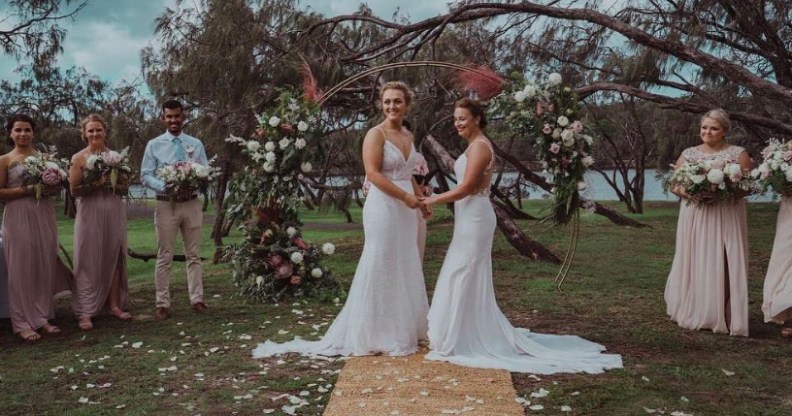Cricketers Hayley Jensen and Nicola Hancock just got married

Cricketers Hayley Jensen and Nicola Hancock get married. (Credit: Twitter/ Melbourne Stars)
Two professional cricket players from Australia and New Zealand have tied the knot in a beautiful same-sex ceremony.
Nicola Hancock, 23, who plays for the Melbourne Stars, and her partner Hayley Jensen, 26, are pictured wearing long white dresses at what appears to be an outdoor wedding.
The pair both played for the Melbourne Stars before Jensen made the cross-town move to the Melbourne Renegades.
Melbourne Stars announced the wedding, which took place last weekend, on Twitter and posted a message of support for the pair.
Jensen shared a tweet prior to her big day. “And in 2 days you will be my wife,” she wrote accompanied by love heart emojis.
According to a Facebook post, Hancock will take Jensen’s surname.
From #TeamGreen, congratulations to Stars bowler Nicola Hancock who married her partner Hayley Jensen last weekend! pic.twitter.com/QvWb7Ue0Qx
— Melbourne Stars (@StarsBBL) 18 April 2019
The pair have rarely spoken about their relationship to the press, but in one interview last year Jensen mentioned Hancock was helping her through a long-term injury and short-term ban from the game.
Same-sex marriage in New Zealand
Equal marriage has been legal in New Zealand since April 2013. A bill of legislation was passed by the House of Representatives which won by 77 votes to 44. The bill was granted royal assent on April 19 that year.
New Zealand was the 13th country in the world to legalise equal marriage, behind only Argentina, Belgium, Canada, Denmark, Iceland, Netherlands, Norway, Portugal, South Africa, Spain, Sweden, and Uruguay.
The country was only the second Commonwealth realm to legalise equal marriage. The first was Canada which legalised equal marriage in 2005.
Same-sex marriage in Australia
Marriage equality was more of a struggle in Australia after the country held a referendum on the issue in 2017. 61.6 percent of people voted in favour of same-sex marriage and on December 9 it was legalised in the county.
However, a study found that LGB people experienced significant “psychological distress” during the public vote. Researchers at the University of Sydney’s School of Psychology assessed the mental health of 1,305 Australian gay, lesbian and bisexual people during the referendum.
Researchers explained: “More frequent exposure to negative anti-LGB media messages was associated with increased psychological distress in LGB Australians during the postal survey.”

